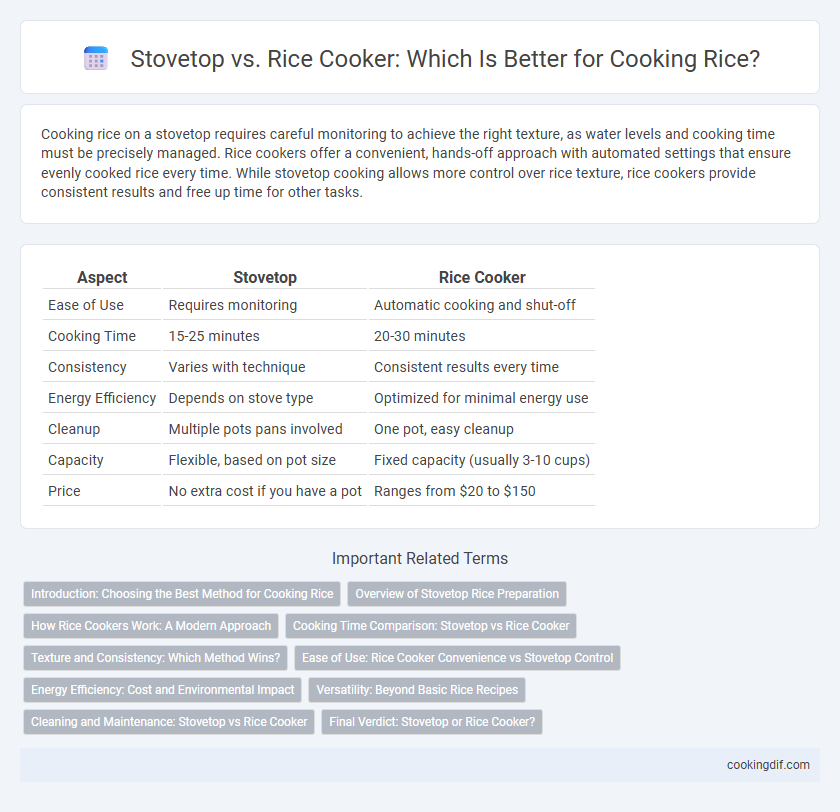Cooking rice on a stovetop requires careful monitoring to achieve the right texture, as water levels and cooking time must be precisely managed. Rice cookers offer a convenient, hands-off approach with automated settings that ensure evenly cooked rice every time. While stovetop cooking allows more control over rice texture, rice cookers provide consistent results and free up time for other tasks.
Table of Comparison
| Aspect | Stovetop | Rice Cooker |
|---|---|---|
| Ease of Use | Requires monitoring | Automatic cooking and shut-off |
| Cooking Time | 15-25 minutes | 20-30 minutes |
| Consistency | Varies with technique | Consistent results every time |
| Energy Efficiency | Depends on stove type | Optimized for minimal energy use |
| Cleanup | Multiple pots pans involved | One pot, easy cleanup |
| Capacity | Flexible, based on pot size | Fixed capacity (usually 3-10 cups) |
| Price | No extra cost if you have a pot | Ranges from $20 to $150 |
Introduction: Choosing the Best Method for Cooking Rice
Stovetop rice preparation offers precise control over heat and texture but requires close attention to prevent burning or sticking. Rice cookers provide automated cooking with consistent results, using sensors to adjust temperature and timing for perfect rice every time. Selecting between these methods depends on factors like convenience, cooking frequency, and desired rice texture.
Overview of Stovetop Rice Preparation
Stovetop rice preparation involves boiling rice in a pot with water, requiring careful attention to water-to-rice ratios and cooking time to achieve the desired texture. This traditional method provides control over the cooking process, allowing adjustments based on rice type and personal preference. However, it demands more active monitoring compared to the automated settings of a rice cooker.
How Rice Cookers Work: A Modern Approach
Rice cookers utilize precise temperature sensors and automated timers to consistently control the cooking process, ensuring perfectly steamed rice without constant monitoring. These devices typically operate by bringing water to a boil, then reducing heat to maintain a simmer until the water is fully absorbed by the rice grains. Advanced models often feature fuzzy logic technology to adjust cooking times and temperatures based on rice variety and quantity, enhancing texture and flavor compared to stovetop methods.
Cooking Time Comparison: Stovetop vs Rice Cooker
Stovetop cooking time for white rice typically ranges from 15 to 20 minutes, while brown rice requires around 40 to 50 minutes, depending on water absorption and heat control. Rice cookers automate this process with preset timing, usually cooking white rice in 10 to 15 minutes and brown rice in 40 to 60 minutes, ensuring consistent results without constant monitoring. The precise temperature regulation and built-in sensors in rice cookers optimize cooking time efficiency compared to stovetop methods.
Texture and Consistency: Which Method Wins?
Stovetop cooking allows for more control over water absorption and heat, resulting in a firmer texture and customizable consistency, but requires careful monitoring to prevent uneven cooking or burning. Rice cookers use automated temperature regulation and timing to produce consistently fluffy and evenly cooked rice with minimal effort, making them ideal for achieving perfect texture reliably. For those prioritizing precision and ease, rice cookers tend to deliver superior consistency, while stovetop methods offer greater flexibility for texture variations.
Ease of Use: Rice Cooker Convenience vs Stovetop Control
Rice cookers offer unparalleled convenience with preset cooking programs that ensure perfectly cooked rice without constant supervision. Stovetop cooking provides greater control over texture and doneness by allowing manual adjustments of heat and timing throughout the process. For effortless operation and consistent results, rice cookers are preferred, while stovetop methods appeal to those seeking precision and customization.
Energy Efficiency: Cost and Environmental Impact
Stovetop rice cooking generally consumes more energy due to longer cooking times and inconsistent heat distribution, resulting in higher electricity or gas bills. Rice cookers use thermostats to optimize cooking time and temperature, significantly reducing energy consumption and lowering overall environmental impact. Choosing a rice cooker can lead to cost savings and reduced carbon emissions, making it a more sustainable option for everyday use.
Versatility: Beyond Basic Rice Recipes
A rice cooker offers versatility by seamlessly cooking various grains and even steaming vegetables or proteins, making it ideal for diverse recipes beyond basic rice dishes. Stovetop preparation demands close attention to heat and timing but allows more control over texture and flavor customization for specialty rice meals like risottos or pilafs. Choosing between stovetop and rice cooker hinges on the need for multitasking convenience versus precise culinary techniques for complex dishes.
Cleaning and Maintenance: Stovetop vs Rice Cooker
Rice cookers generally offer easier cleaning and maintenance due to their non-stick inner pots and detachable components, which can be wiped or rinsed quickly. Stovetop pots may require more effort to scrub burnt residues and often need careful drying to prevent rust or damage. Frequent use of rice cookers typically results in less leftover residue and reduces the risk of uneven cooking buildup compared to stovetop methods.
Final Verdict: Stovetop or Rice Cooker?
Rice cookers provide consistent results with minimal effort by using precise temperature control and automatic shut-off features, making them ideal for busy households. Stovetop methods offer more control over texture and are preferred by those who enjoy hands-on cooking but require careful attention to prevent burning or uneven cooking. For reliable convenience and perfectly cooked rice every time, rice cookers are generally the better choice.
Stovetop vs Rice cooker for preparation Infographic

 cookingdif.com
cookingdif.com